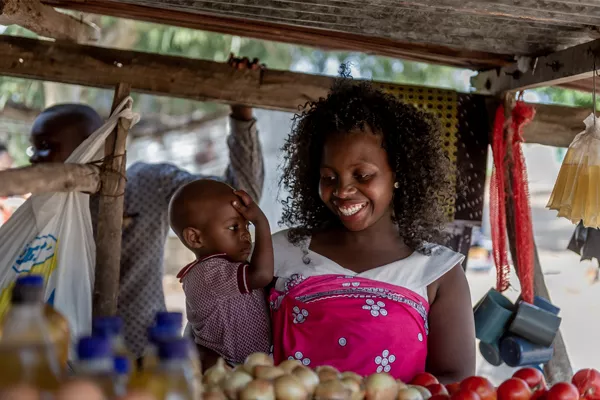Community activism against family and gender-based violence in Mozambique

Photo: Cornel van Heerden.
Laura* has seen enough of the negative consequences of violence in her community that she has taken up the fight against family and gender-based violence. A decrease in violence against women, young girls and children can only be achieved through increased awareness and knowledge of the causes of this violence, how harmful it is and how to resolve conflicts without violence.
About Laura
Laura, 31, lives and works in Nhangau, a small local community outside Beira in Mozambique. After her husband died, she received support from SOS Children's Villages Family Strengthening Program to expand her market stall. One of her biggest worries was making enough money to pay for her children’s schooling. She increased her income even more by preparing and selling hot lunches at the market. She now earns enough to support herself, her three children, her aunt, and her little sister's schooling.
A huge problem
Gender-based violence is a significant challenge in Mozambique, where 37% of women aged 18–49 have experienced physical or sexual violence, mainly from their partners, and a staggering 53% of women aged 20–24 were married before they turned 18.
Laura says that many women do not dare tell about the violence they are exposed to for fear of reprisals from the man. This makes it difficult to break the spiral of violence, which affects not only the women but also the children in the families.
Laura's involvement in empowering women and children in her community is an excellent example of the positive side effect of strengthening families.
Taking up the fight for others
Laura decided to take up the fight against domestic violence in the local community. She joined a local group that works in several areas, including gender-based violence and education, and gives lectures and organizes discussion forums. She is very clear about how important it is that women know their rights, that they know that they are not alone and that there is help to be had.
"When we started this work, very few dared to speak up. They were threatened with more violence if they told anyone about it, and many women did not know that they were entitled to protection and help. Now we have fewer cases because women dare to speak up, and husbands and partners know they risk being reported. The next step is general attitude changes, but that takes time. The most important thing now is that women avoid being exposed to violence,” says Laura.
Increased awareness of the parental role and the significant negative consequences of parental violence is part of SOS Children's Villages' support for families. Laura, who saw how many parents indicated violence in their upbringing, began to talk about the positive effects of avoiding physical punishment of children. And gives advice and tips on parenting to others.
Women and girls learning about their rights
Laura started working on raising awareness of parenting skills and domestic violence in her local community. Together with others, she makes a difference in women’s and children’s everyday lives.
“We train women on their basic rights and how domestic violence is not something they just have to endure. We tell them that they can report the abuse to the police and get help to get out of a violent relationship. The fact that men now know they risk being reported has reduced domestic violence,” Laura states.
Local groups such as the one Laura is with play an important role in reducing the number of incidents of violence against girls and women. Laura's group is doing the important work of coordinating their efforts with schools, local leaders, justice authorities and SOS Children's Villages.
